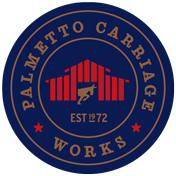It’s a safe bet that if the mules and horses working local carriage tours could talk, they could easily recite the best parts of Charleston’s history. They’ve certainly heard the stories plenty of times as they mosey through the city streets.
Carriage tours are a popular activity and the steeds pulling the carriages may very well be the city’s best ambassadors, drawing in visitors with their easy gait and gentle spirit.
They play an important role in Charleston tourism, and Benjamin Doyle of Palmetto Carriage Works knows it. That’s why he takes such good care of the animals who pull his carriages, ensuring they are healthy and happy employees.
They may not be earning a paycheck but they get plenty of vacation time and the health care package is pretty tough to beat.
Doyle carefully selects horses and mules that can tolerate Charleston’s warm climate and are gentle and not bothered by people, traffic and city noise. Most often the animals have retired from pulling plows all day, usually in Pennsylvania’s Amish country. They semi-retire to Charleston – as so many from that area do – and take up work pulling carriages.
It’s an easier job than life on the farm – the days are shorter, the loads lighter and the carriages have wheels.
Doyle – whose father purchased Palmetto Carriage in 1979 – explains how his company carefully follows the rules and regulations laid out by the City of Charleston for carriage tour operators, often going a step further to provide the very best care for the animals.
The city regulates the weight of the carriage, requires records on the animals’ body temperature and work activity and conducts veterinarian inspections twice a year.
For example, when the temperature reaches 98 degrees or the heat index hits 125 degrees, all carriage tours must stop operations. Beginning at 85 degrees, carriage tour operators have to take their animals’ body temperature but Palmetto does this year-round. Doyle said it’s a good way to monitor to any potential issues and to ensure the animals have plenty of time to cool off under the fans behind the barn.
Palmetto Carriage has 35 mules and 20 horses that rotate between the barn downtown and the company’s farm on Johns Island. Animals at Palmetto Carriage work about 150 days a year – that’s about 14 hours each week.
“If I don’t take care of them and keep them happy, it shows,” Doyle said. “My reputation is at stake. Not only did I give this animal a second chance, but we give them a great life.”
The Big Red Barn is open to the public and Doyle is happy to show visitors around and explain the process for caring for the animals. Stop by and check it out at 8 Guignard St. near the City Market. Hours are 9 a.m .to 4 p.m. Monday to Sunday.
